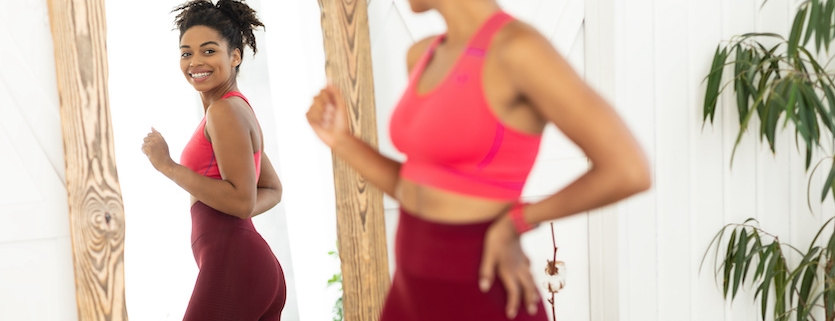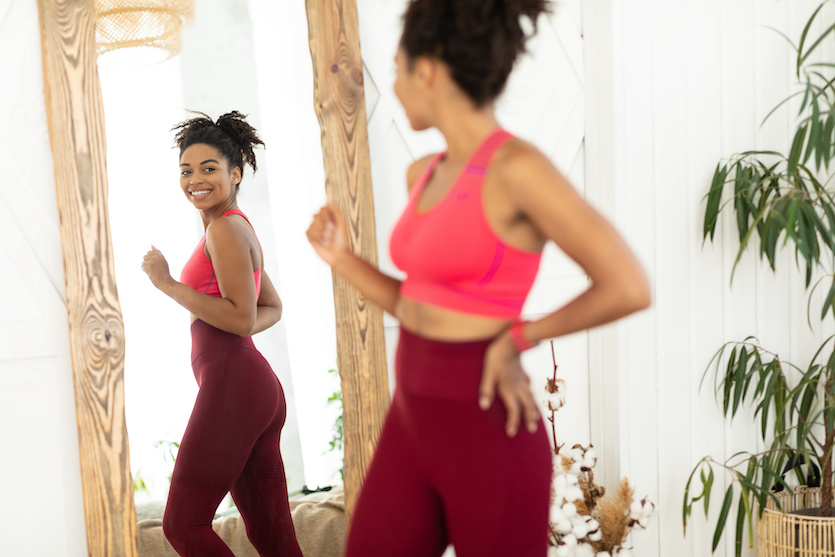Delve into the Psychology of Body Image, Body Positivity, and Body Acceptance
Your body image is the way you view yourself—the mental picture you’ve created from several factors. Naturally, physical metrics—like body size and weight—play a part in shaping your image of yourself. But psychological, mental, and emotional factors make just as big of an impact on how you see yourself, and how accepting you are of your body.
Here’s the catch: your body image isn’t always accurate. Your perception—shaped by all the facets listed above—can be skewed. You’re often your harshest critic—especially when it comes to the way you look.
A negative body image can impact your life in many ways and keep you from feeling your best. Nobody wants that, so it’s time to start untangling the psychology of weight, body image, body positivity, and body acceptance.
What is Body Positivity?
The body positivity discussion exists on an individual and societal level.
On an individual basis, body positivity describes a frame of mind. When you’re body positive, it means you generally feel good about your body. This includes accepting the changes that your body naturally can—and will—experience. Body positivity requires having realistic expectations for yourself, and, more importantly, being forgiving of your body as it changes.
Body positivity also describes a broader social movement. Society has had unrealistic beauty standards for about as long as popular media has existed. And that’s a long time. In recent years, people have talked more openly about the negative effects these beauty standards can have on individuals. When you are constantly exposed to unrealistic images of how you “should” look, it’s pretty hard to feel good about yourself. Makes sense, right? The body positivity and body acceptance movement is simply people calling for changes to the norm. Advertising and media should reflect the real world: this means representing people of all shapes and sizes.
So contrary to popular belief, body positivity isn’t a fad. And it certainly is not encouraging people to be unhealthy. Rather, body positivity is a frame of mind and a social movement simply encouraging people to be more accepting of themselves and others.
Factors That Influence Body Image
The human brain is constantly taking in and processing information—both consciously and unconsciously. It’s one of the things that makes life so interesting. But it can also be a bit inconvenient. Because of your brain takes in so much information, your body image is often influenced unconsciously by the world around you.
Some factors that might have a negative impact on your body image include:
- Culture and family: Beauty standards vary from culture to culture. How well you fit in with your culture’s ideas of beauty can have a lasting impact on the way you view yourself. Your family can have a similar influence—for better or for worse. A supportive, body positive family can help foster body acceptance in children. Unfortunately, the inverse is also true. Judgmental family members can have a lasting toll on an individual’s self-image.
- Media: As mentioned above, advertisements and other forms of media—especially those related to the fashion industry—play a big role in shaping society’s beauty standards. And often, those standards are unrealistic. Comparing yourself to an unattainable (and possibly unhealthy) standard of beauty often leads to a negative body image. Try to be mindful of the media you consume—especially on social media!
- Weight loss or fluctuations: Rapid or extreme changes to your appearance can impact body image for the worse. This even includes weight loss. Many people who shed weight rapidly still have a negative body image. One possible cause for this is “phantom fat,” a phenomenon in which people still feel overweight, and even view themselves as overweight after they have quickly dropped some pounds.
- Skin conditions: Body image isn’t all about weight and size. Acne, scarring, and other changes to your skin can impact body image, too. Because of airbrushing, makeup, lighting, and other post-production tricks, people in the media always seem to have perfect-looking skin. Remember: this doesn’t necessarily reflect how those people look in reality. And you exist in the real world. So when you compare your skin to theirs, you’re not being fair to yourself.
Body Image and Health: The Effects of Body Positivity on Your Physical and Mental Wellbeing
Most people want to feel good about the way they look—to have a positive body image. It might sound simple, but this goal can be harder to reach than you might expect. But there are good reasons why it’s worth it to keep aiming for body positivity.
After a while, body negativity can take a toll on your mental wellbeing. Body positivity and body acceptance, on the other hand, can boost your confidence, mood, self-esteem, and general sense of wellness and fulfillment. This can help reduce social anxiety, improve your performance at work, and benefit your interpersonal relationships.
And the benefits don’t stop there. Positive body image is also linked to healthier lifestyle habits. People with a positive body image tend to maintain a healthier diet, smoke less, and drink less alcohol than their body-negative peers. This creates a positive feedback loop. The better you take care of your body, the better you’ll feel about it. And the better you feel about your body, the more you’ll want to take care of it.
Phantom Fat: The Psychological Effects of Weight Loss on Body Image
Contrary to popular belief, improving your body image isn’t always a matter of losing weight. This is because, as mentioned above, your body image isn’t always tied to how you look—it often has more to do with your thoughts and other mental and psychological elements.
A phenomenon known as phantom fat is good example. When a person loses a substantial amount of weight—enough to change their physical appearance—they sometimes still see themselves at their previous weight and size. And they still feel their “phantom fat” on their body. People experiencing phantom fat report worries about knocking things over and perceive themselves as much larger than they actually are.
People’s experiences with phantom fat vary greatly. And there’s not one guaranteed way to help your brain catch up with the way you look. Often, it just takes time. After years and years of learning to view yourself one way, it can take a while to change those thought patterns.
Changing your brain can take longer than changing your body, but that mental adjustment is possible. Whether it’s replacing negative thought patterns with positive ones, throwing out the scale, or reciting affirmations, there are countless strategies for boosting your body image. It’s just a matter of finding what works for you.
Tips for Maintaining a Body-Positive Mindset
At this point, you probably have one main question: if body positivity is so important, what can you do to keep your body image positive? There’s no fix-all solution—body acceptance and positivity look different for everyone. Try a few of the following tips and practices to see which help keep your body image positive!
- Keep your self-talk positive: If you find you frequently experience critical thoughts about yourself and your appearance, try replacing those criticisms with self-affirmations.
- Move your body every day: You may be sick of hearing about the benefits of exercise, but there’s a reason you hear so much about it. Exercise really works wonders! A little bit of movement each day, even if it’s not rigorous exercise, can really help you keep your self-image up. This could mean jogging, cleaning, dancing, or going for a walk.
- Be kind to yourself: A lot of people write self-love and self-care off as corny and unimportant. Don’t let that be you! There’s no right way to practice self-care, but try doing something each day that is truly for yourself. This could be as simple as setting time aside for reading a good book or as involved as going out for a massage.
- Wear clothes that make you feel comfortable: When considering your clothing choices, be sure to account for two factors: how the clothes feel physically and how they make you feel. If your clothes are too tight, itchy, or otherwise uncomfortable, it’s hard to feel good about yourself. Try to find clothes you like the look of that are also comfortable.
- Be mindful of who you surround yourself with: Your friends, coworkers, and peers can have a huge impact on your self-image. Try to surround yourself with positive people who make you feel good. This goes for social media, too! A social feed full of negativity won’t do your thoughts any favors.
References
https://www.psychologytoday.com/us/basics/body-image
https://www.ncbi.nlm.nih.gov/pmc/articles/PMC5845121/
https://www.medicalnewstoday.com/articles/249190
https://www.ucihealth.org/blog/2020/01/weight-loss-psychology
https://www.nbcnews.com/id/wbna31489881
https://pubmed.ncbi.nlm.nih.gov/9152700/
https://mindwise.org.au/how-does-body-image-affect-our-mental-health/.













